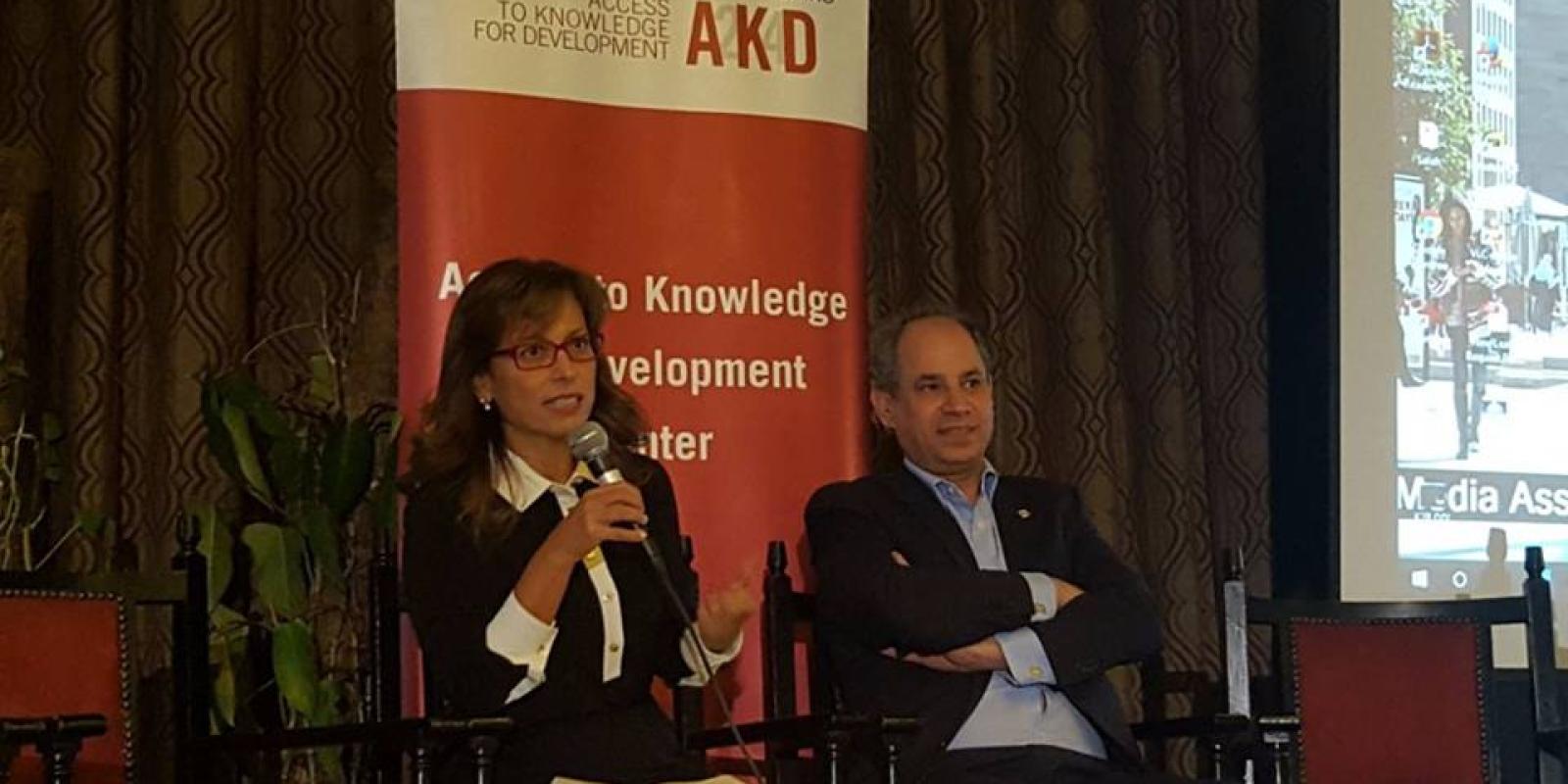
Access to Knowledge for Development: Community Impact Through Research
Bringing together regional and global scholars to discuss new trends and innovations in the fast-paced fields of open data, makerspaces and mobile telephones, the annual Access to Knowledge for Development (A2K4D) Center's workshop focused on promoting social responsibility and meeting the needs of the community through the University's research. It also featured the soft launch of the center's Solar Data Platform, an online, open-data platform for users in different sectors.
The workshop included partners from Canada, Tunisia, Lebanon, Palestine, South Africa and Kenya, in addition to local partners in Egypt. "The A2K4D workshop this year brought together a community of enthusiasts from all areas of our multidisciplinary work," said Nagla Rizk, economics professor and A2K4D director. "From data, makerspaces, innovation, development and beyond, we had the unique chance to host interesting and inspiring conversations. We had speakers from our regional and global networks, with visitors joining us from all over the world, bringing critical insight and new opportunities for collaboration in the region."
At the workshop, titled Collaborative Innovation for Open and Inclusive Development: Data, MakerSpaces and Mobile Telephony, Provost Ehab Abdel Rahman discussed AUC’s pivotal role both in the region and internationally, serving as a hub for education and research. “We believe in social responsibility, exhibited by our commitment to exploring the challenges that confront Egypt, the region and the world, and to using our intellectual and creative capabilities to address these challenges, serve our communities and have a positive and sustainable impact on development, business, the environment and society,” he said.
Further emphasizing the need to effect change through the University's research, Nagham El Houssamy, senior researcher at the A2K4D center, described the aim of the annual workshop. “The goal is to showcase our work and involve the community,” said El Houssamy. "There is no point of conducting research without impact, and there is no impact without involving the community. These workshops create space for more food for thought, allowing us to think about what we can do next and how we can move forward.”
Over the past seven years, A2K4D has established a wide-reaching global presence, boasting 24 partners in 15 countries over five continents. “A2k4D’s location in Egypt adds a needed perspective to the conversation by giving the Arab world a voice on these crucial topics,” observed Abdel Rahman
The two-day workshop featured sessions that introduced, discussed and deliberated the center’s various research projects and partnerships. "The end goal of these diverse projects has been to provide empirical and localized data for enhanced evidence-based planning in the region, particularly when existing data-sets are few and far apart," said El Houssamy.
The first session brought together members of the Open Data for Development Middle East and North Africa Node, which A2K4D is leading, to discuss ongoing projects within the network. Participants shared their knowledge on how open data can contribute to development in the areas of gender, health and mobility. The second panel tackled the different potentialities of data in advancing research in the fields of transportation and urban mobility, education and renewables. During the third session, participants shared experiences on how makerspaces, spaces, which foster creative invention, can contribute to business generation and employment in a sustainable manner. The final session explored knowledge societies in the Global South, drawing on various examples from A2K4D's research on the digital economy and other work by their partner, the Internet Corporation for Assigned Names and Numbers.
At the event, AUC panelists carried out a walk-through of A2K4D's Solar Data Platform. "The online platform will allow actors along the solar value chain – from manufacturers, suppliers, installers, clients and supporting institutions – to create ‘profiles’ based on a data sheet," explained El Houssamy. "Data provided by these users is available freely as open data online, providing information on who is doing what in the sector, and where gaps appear in the value chain. Developed by the team with InsideOut Today and sponsored by the International Development Research Center and Friedrich Ebert Stiftung, the platform is now live and accessible for the public to use."
The workshop is a reflection of AUC’s immersion in global conversations and engagement in research aimed at tackling social issues. “While our academics are world-class and worthy of recognition, it is our research and dedication to addressing social issues through policy reform that makes us truly unique,” Abdel Rahman asserted.
